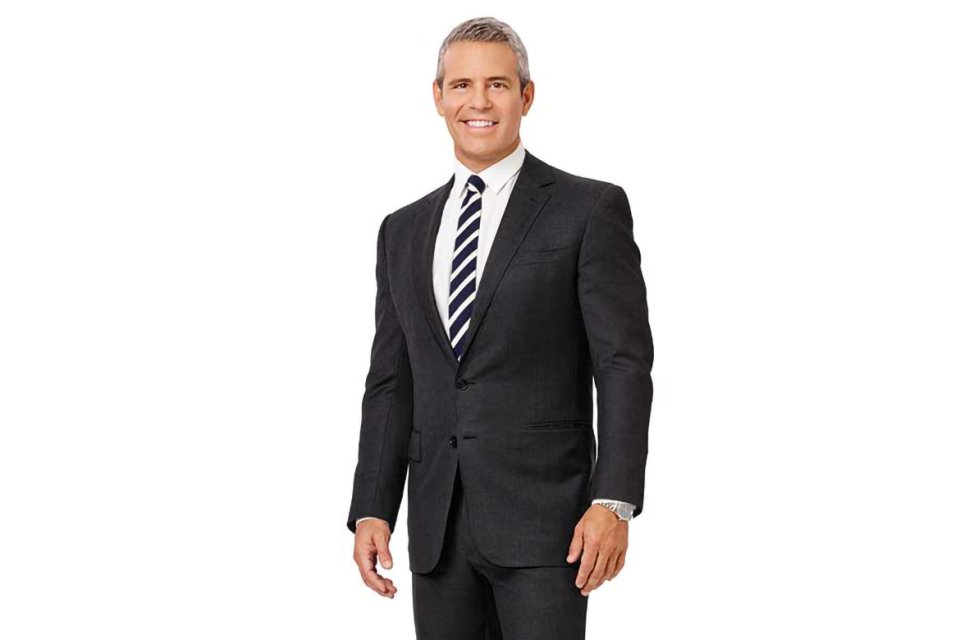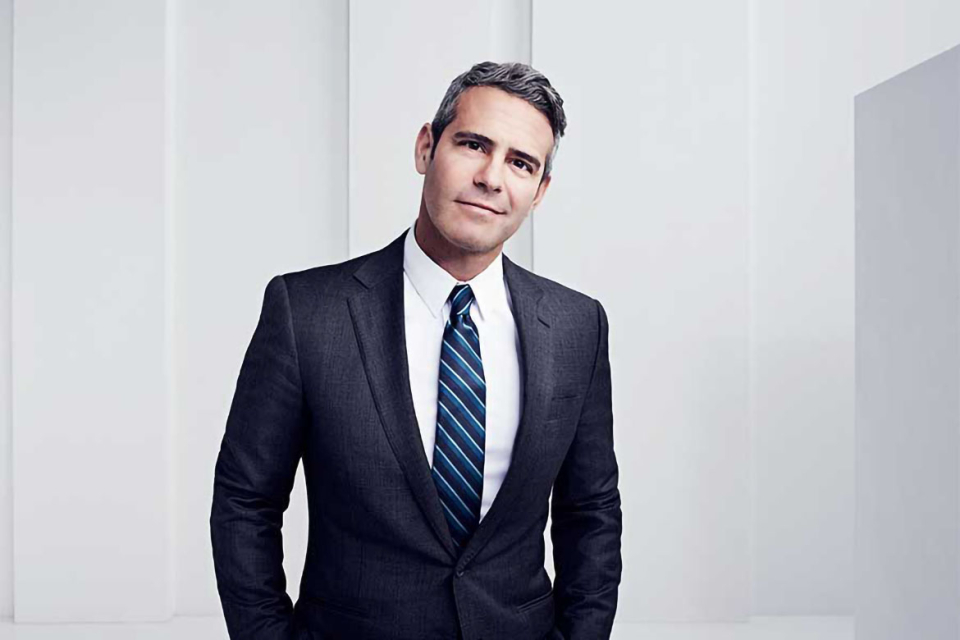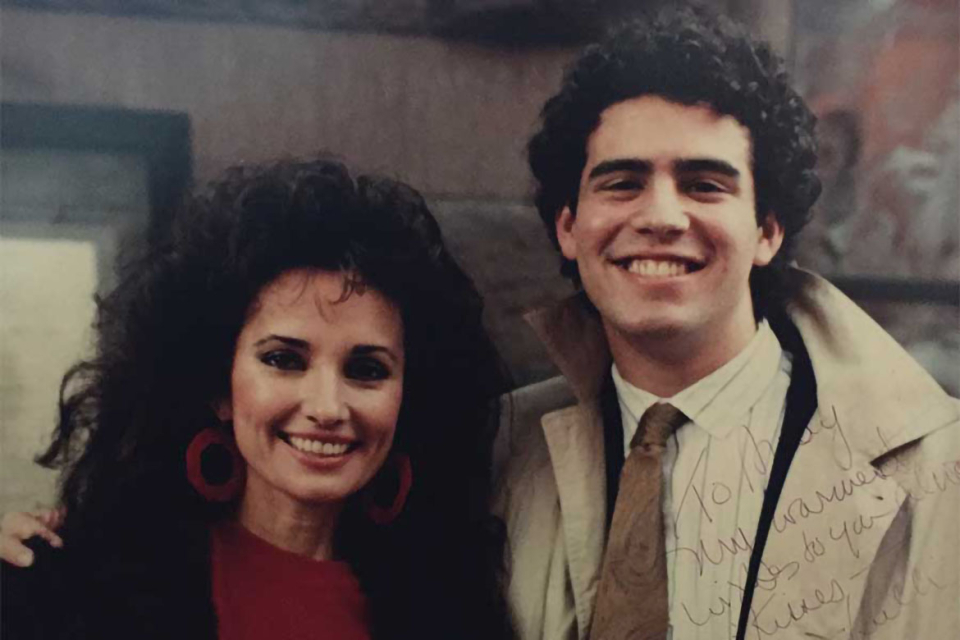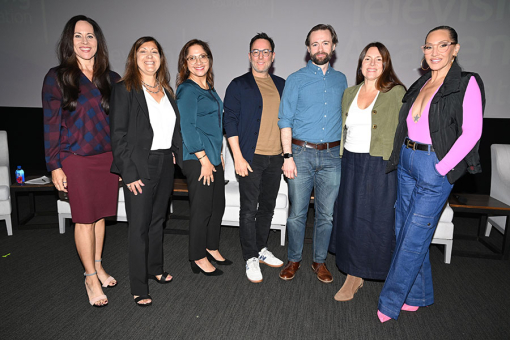It’s no surprise that Andy Cohen titles his 2012 book Most Talkative.
His yearning to yak appeared early and often got him into trouble. At 14, for example, on a family trip from Missouri to Florida, he decided to do a play-by-play commentary for the entire two-day drive - and stopped only when his aunt dumped a pitcher of iced tea over his head.
But that loquaciousness — and his childhood love of television — would take him far. By 16 he was the youngest intern at the CBS affiliate in St. Louis, and by the summer of his senior year in college he was interning at CBS News in New York.
While his subsequent career as a producer and executive would take him from CBS News to Trio and then to Bravo, it was at Bravo that he got his first taste of performing for the camera.
As the host (and executive producer) of Bravo's Watch What Happens Live (he's also an executive producer of The Real Housewives franchise), Cohen offers late-night viewers a TV experience unlike any other — live, unrehearsed, interactive —and everyone is offered a cocktail.
"We've had many crazy moments," he says.
Cohen was interviewed by Jenni Matz in July 2015 for the Television Academy Foundation's Archive of American Television. The following is an edited excerpt of that interview;
The entire discussion can be viewed at TelevisionAcademy.com/Archive.
Q: What were some of your interests growing up?
A: I loved all TV. I loved TV news. I loved Donny & Marie, Cher, The Brady Bunch. Battle of the Network Stars was like a national holiday for me because I couldn't believe that I was seeing all these TV stars as themselves all together. When I got to junior high school, I started watching All My Children. I became really obsessed with it. Obsessed! I loved talk shows, loved The Tonight Show with Johnny Carson when Joan Rivers subbed — that was also like a national holiday for me.
Q: Did you have any inkling that you wanted to be on camera or involved in television?
A: I think, in the back of my mind, I knew 1 wanted to be on camera. But it seemed so egotistical. I'm from St. Louis. It's so funny when I look back at it now. Here we live in the most ego-driven moment in history, when everyone wants to post pictures of themselves — including me. It's funny to think that I was too scared to tell people that I wanted to be on camera. My way of making it acceptable was to say I wanted to be in TV news. That seemed like the respectable way to be in front of the camera.
Q: What did you study in school?
A: I went to Boston University and studied broadcast journalism. Along the way I did an internship at KMOV in St. Louis, which was then KMOX, a CBS affiliate. I was the youngest intern there. It was a summer internship, kind of defining for me. I loved being in the newsroom. I loved the atmosphere. It was very exciting. It made me think, "Yeah, this is where I want to be."
Q: How did you land your first job?
A: I did a lot of internships, and my last one was at CBS News in New York, at CBS This Morning. I really wanted to be at The Evening News, but they assigned me to the morning show, which at the time was the number-three morning show. But once I got there I realized, "This is actually a great place for me."
Q: You eventually left CBS to work for the Trio network. How did that come about?
A: When I was at CBS News, I got to know Barry Diller personally through a friend. I was always begging him to buy CBS because I knew he would have respect for the news division.
Finally, he came to me and said, "I acquired this suite of digital channels from some Canadian company, and one of them is going to be an arts channel" — his version of PBS. He said, "I think you would be great at running programming. You go out every night, you see everything, you love entertainment."
At that point I was the senior producer of entertainment at the Morning show. I was getting a little burnt out at CBS and I realized, "I've been offered a job by Barry Diller to run this tiny cable channel!" While I was writing my own ticket at CBS, running my own little kingdom and loving it, I recognized that this was a great opportunity, so I left.
Q: What was the job like?
A: It was kind of cable boot camp. It wasn't very glamorous. It was all research and development. We did a series of documentaries, and sometime around this time Lauren Zalaznick came in — she's probably the biggest mentor in my career. We did something called Brilliant But Cancelled, about shows that were on before their time.
We did a documentary about censorship; we did a documentary called Gay Republicans — really cool, fun, edgy stuff that got a lot of press. Then Barry sold his company to Universal, and Universal merged with NBC and they decided that they would rather air crime reruns from the Universal library. So Trio itself became brilliant but cancelled.
Q: How did you end up at Bravo?
A: NBC Universal chose Lauren to go over to Bravo. And she said, "I want you to come to Bravo and run current programming for me." I said to myself, "I don't know... I think Bravo seems kind of lame."
Viacom was starting a channel called Logo, a gay cable channel, and that sounded really cool and up my alley, given how gay I am. So I interviewed for that job, and they didn't hire me! But I am so glad I didn't get it, because I wouldn't have gotten to where I am today. I went to Bravo and wound up supervising Project Runway.
Q: ...and Queer Eye for the Straight Guy.
A: I supervised almost 100 episodes of Queer Eye, which was amazing. Those boys, within week three of that show, were on the cover of Entertainment Weekly. They were my first example of real people who became famous and what it did to them. Some of them became really nice; some of them were horrible.
A couple of years ago, one of them made amends to me and said, "I am so sorry for how I behaved." By then I was so used to dealing with beasts that I said, "Don't even think twice about it. I've dealt with so much worse than you at this point." But at the time it was really bad.
I've been very close to the world of making normal people famous. I'm a normal person who became famous, and I've learned there are two ways to react: a good way and a horrible way. That's been an interesting part of my management expertise, managing that.
Q: Weren't shows like Queer Eye created to reinvent Bravo?
A: Lauren [former Bravo president and chair of NBCU Entertainment, Digital Networks and Integrated Media] realized a few years into Queer Eye that all of our shows fit into the five areas represented by Queer Eye's fab five: food, fashion, beauty, design and pop culture. It was a great way for us to define ourselves. From then on, every show fit into one of those categories.
Q: What was your role with Project Runway?
A: It was already pitched and fully developed with the great Magical Elves production company. The Magical Elves found Tim Gunn and brought him to Bravo.
I will take no credit or responsibility for Project Runway. I was an executive producer, giving notes. I was involved in casting seasons two through five. I was with the creative team, thinking up challenges, booking people and guest judges.
Q: Then you went to Top Chef.
A: Soon after Project Runway, Lauren said, "I want to do for food what we did with fashion." That is when Dave Serwatka and I — and Lauren and Frances [Berwick, now president, Lifestyle Networks, NBCU Cable Entertainment] and the Magical Elves — developed and created Top Chef.
Dave and [fellow executive producer] Shauna Minoprio found [head judge] Tom Colicchio. Lauren wasn't too keen on him at first; he was really low-key. My biggest nightmare was, we couldn't find a host. It was really bad, until Dave and I interviewed Padma [Lakshmi]
We loved her. Here was this hot woman who could talk about food. And she had written two cookbooks at the time — she seemed perfect, But she was going to shoot a miniseries in India, and she didn't want to be on reality TV.
Q: So you hired someone else.
A: Lauren was emailing me, saying, "What are we going to do about a host?" I was bringing her all these ideas and she was rejecting them. I've had many sleepless nights as a TV executive.
Finding the host for Top Chef was definitely [in my] top five. It was horrible. I was terrified.
About a week before we were in production, a woman I knew at Sony called. She said, "Billy Joel's wife, Katie Lee, loves food. She is beautiful, I think you should interview her." I interviewed her, we put her on tape and we hired her. And she was the host of Top Chef for the first season.
Q: What didn't work?
A: It wasn't Katie Lee's fault. She had a southern accent. Bravo's identity was not southern. A southerner on Bravo just didn't feel like Bravo, She was very young, and everyone knew her only as Billy Joel's wife. I think her youth and inexperience didn't work with viewers. Then Padma became available. We hired her for season two, and the rest is Top Chef history.
Q: The same year that Top Chef began, Bravo launched The Real Housewives. How was the decision made to green-light that show?
A: Someone named Scott Dunlop came to Bravo with tape that he had shot of his neighbors in Coto de Caza [in Orange County, California], It had weird narration on it; I think it was him narrating — it was almost like a wildlife correspondent commenting on the wildlife in his neighborhood.
You saw Vicki [Gunvalson] going down her slide; she had this grotto in her backyard. These women on the tape — their hair was blonder, the boobs were bigger, their kids were hotter than anything you had seen and they were really wealthy. And they lived in this huge gated community. They wanted to keep people out, but they were letting cameras in.
Q: What was the concept for the show?
A: We said, "There's something here. Go shoot some more." In my mind, if it worked, it would be a story because they all lived in the same neighborhood. It would be like a modern-day soap opera.
On All My Children, they all ate at the same restaurants and went to the same beauty salon, I said to the producers, "You should localize this. They all go to the same tennis club, the same country club. Shoot it like a soap opera." They were shooting and shooting and then cutting the shows. They didn't have what they said they had, and it was not good.
Q: How did it turn around, then?
A: Shari Levine was supervising the show and should be getting the majority of the credit for creating The Real Housewives, because she was there in the trenches for Orange County.
She was like, "We have to shoot more." There were stories that didn't follow through. We wound up going to Lauren and Frances and saying, "Look, if we kill the show now, it will wind up costing us another S400,000."
And Lauren said, "Finish the show and we'll see what happens."
Q: And that's how the franchise started?
A: We finished it, and I remember it was going to be called The Real Housewives because Desperate Housewives was really big. A marketing exec at the network had the idea to have them all holding oranges, because in Desperate Housewives they all held apples. And there was some threat of a lawsuit from ABC because of the fruit.
I remember Lauren sending an email saying, "You can't copyright fruit. That's ridiculous, We're doing this." So that's how that happened. Near the time it was going to premiere, Lauren slapped "of Orange County" into the title. She did it in case we ever wound up doing a Real Housewives in another city.
Q: What did you think of the title?
A: I remember saying to Shari, "That is the dumbest title I've ever heard. The Real Housewives of Orange County? What does that even mean?" I thought it was ridiculous. But then I thought Battle of the Network Reality Stars was going to be a hit, so what do I know?
Q: In later seasons, Bethenny Frankel — who wasn't actually a housewife — broke out.
A: We wound up doing New York, and it was called Manhattan Moms at first. After seeing the casting, I was a big advocate for calling it The Real Housewives of New York.
Bethenny wanted to be a housewife; she was living in an apartment, and I originally didn't want to cast her. She'd been on The Apprentice: Martha Stewart, and I thought it was a bad idea to have someone who had already been on a reality show on our reality show. But I'm glad we did. She wound up being the backbone of that show,
Q: Some housewives have had very contentious fights on camera. Were you ever concerned about the safety of anyone on the show? I'm thinking New Jersey.
A: Well, yes, New Jersey. There was a moment where we became concerned, and we had security on the set. But it's always surprising when it gets physical — it's never anything you want. It's bad for the franchise. But the franchise is so much more than that. It's about human drama.
Q: Did you make any changes to The Real Housewives of Beverly Hills after the incident with Taylor Armstrong and her husband's suicide?
A: We cut some stuff out of the season involving him. Season two of Beverly Hills had an ongoing story about Taylor being in a horrible relationship that was potentially a little abusive. There had been whispers about it in season one.
The gentleman she was married to was in grave financial trouble, legal trouble — his world was falling apart. He wound up committing suicide maybe a month before the show was to premiere.
The question became, do we air the show at all? What do we air of him? There were lots of long discussions with all of the housewives, who felt very strongly that they wanted the show to air. Taylor wanted the show to air, and we aired it.
Q: What was the response?
A: We got some flak. There were a lot of half-assed debates on cable news about "Did reality TV kill this man?" If you looked at what he had going on in his life, I would argue strongly as a producer of the show — and I think the women who knew him would as well — that the answer was no. That was one of the reasons we all felt so strongly that we should air this.
One thing about life is, there can be a pretty package, but what goes on inside it is not always pretty.
Q: Let's talk about Watch What Happens Live.
A: We're the only live show in late night. It started as a Housewives after-show, once a week at midnight. We moved to 11, and while we stayed a Housewives after-show, I wanted to prove that the show could be a viable format with real celebrities.
So I twisted my friends' arms and got Jerry Seinfeld and Sarah Jessica Parker and Liam Neeson, among others, to come on. People took notice and said, "Why are these really famous people on this stupid show?"
We wound up making a case to Bravo after two-and-a-half years to strip us and make us a real late-night show. We are the only interactive show in late night. We take tweets. We drink real alcohol.
The concept is, I'm inviting you into my den at 11 p.m. and, if that were my den, the first thing I'd do is offer you a drink. And then I would want to play games, ply you for gossip, and that's what I do with the celebrities on my show.
Q: What else is different about this show?
A: In a galaxy of shows that are so polished, we don't do pre-interviews — every moment is spontaneous. We've had a lot of crazy moments. We've had people get drunk. We've had people swear. We had the fire alarm go off. We've had endless mishaps, and that's what makes this show great.
The authenticity of the environment and the live-ness are what make people like Oprah and Cher and Meryl Streep and Lady Gaga want to be a part of it. It's refreshing to go on a show that's not so canned and forced and set up.
Q: What does the future hold for reality television?
A: I think reality TV will just keep going. It's fascinating, and human behavior is fascinating. It's endless.
This article originally appeared in emmy magazine, Issue No. 6, 2016













